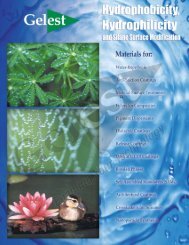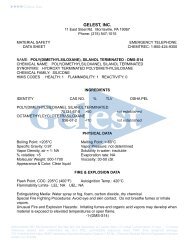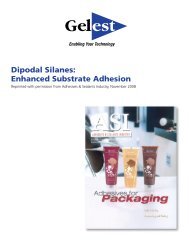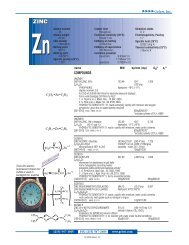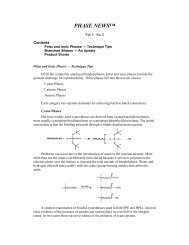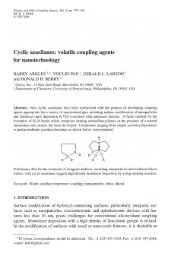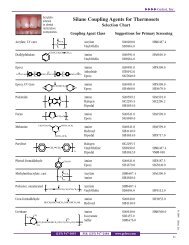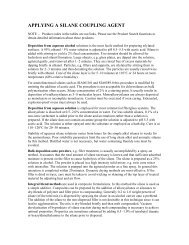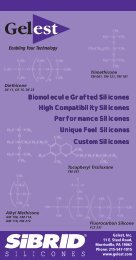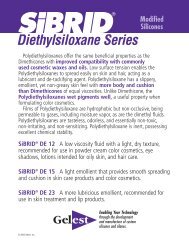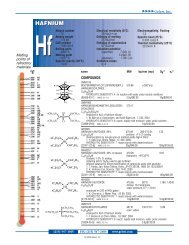Gelest Silicone Fluids - Gelest Inc.
Gelest Silicone Fluids - Gelest Inc.
Gelest Silicone Fluids - Gelest Inc.
You also want an ePaper? Increase the reach of your titles
YUMPU automatically turns print PDFs into web optimized ePapers that Google loves.
▲<br />
▲<br />
▲<br />
▲<br />
<strong>Gelest</strong>, <strong>Inc</strong>.<br />
Conventional <strong>Silicone</strong> <strong>Fluids</strong><br />
Conventional fluids are the well-known<br />
general purpose silicones described in<br />
chemical notation as polydimethylsiloxanes.<br />
They are commercially produced<br />
in viscosities ranging from 0.65 to<br />
2,500,000 cSt.<br />
Conventional silicone fluids are composed<br />
of polymer chains with unique<br />
flexibility. Polydimethylsiloxane has virtually<br />
no energy barrier for rotation.<br />
This results in one of the lowest glasstransition<br />
temperatures of any polymer.<br />
The liquid surface tension of polydimethylsiloxane<br />
is lower than the critical<br />
surface tension of wetting (24<br />
dynes/cm). This causes polymers to<br />
spread over their own adsorbed films.<br />
An important consequence of the low<br />
intermolecular forces in polysiloxanes is<br />
the highest permeability coefficients of<br />
any polmer for oxygen and nitrogen.<br />
The fluids are thermally stable indefinitely<br />
at 150°C in air. <strong>Fluids</strong> with viscosities<br />
of 50 cSt. or greater have negligible<br />
vapor pressure.<br />
At viscosities greater than 1,000 cSt.<br />
correlating to molecular weights greater<br />
than 30,000, polymer chain entanglement<br />
occurs, resulting in leveling of<br />
physical property change vs. viscosity.<br />
Refractive index, surface tension, density,<br />
and viscosity-temperature coefficients<br />
are strikingly flat.<br />
*Product Code Definition<br />
Prefix:<br />
DMS=DiMethylSiloxane<br />
Suffix:<br />
1st character=Trimethylsiloxy terminated<br />
2nd character=viscosity in decades, i.e. 10 X<br />
3rd character=viscosity to 1 significant figure<br />
Polydimethylsiloxanes, Trimethylsiloxy Terminated<br />
Properties<br />
Viscosity<br />
Viscosity Temp. Pourpoint Specific Refractive<br />
Product Code* cSt. Coefficient °C Gravity Index<br />
DMS-T00 .65 .32 -68 .761 1.3750<br />
DMS-T01 1.0 .37 -85 .818 1.3825<br />
DMS-T01.5 1.5 .46 -75 .853 1.3880<br />
DMS-T02 2.0 .48 -80 .873 1.3900<br />
DMS-T03 3.0 .51 -70 .898 1.3935<br />
DMS-T05 5.0 .54 -65 .918 1.3970<br />
DMS-T07 7.0 .55 -65 .930 1.3980<br />
DMS-T11 10 .56 -65 .935 1.3990<br />
DMS-T12 20 .59 -65 .950 1.4000<br />
DMS-T15 50 .59 -65 .960 1.4015<br />
DMS-T21 100 .60 -65 .966 1.4025<br />
DMS-T22 200 .60 -60 .968 1.4030<br />
DMS-T23 350 .60 -60 .970 1.4031<br />
DMS-T25 500 .60 -55 .971 1.4033<br />
DMS-T31 1,000 .61 -50 .971 1.4034<br />
DMS-T35 5,000 .61 -48 .973 1.4035<br />
DMS-T41 10,000 .61 -48 .974 1.4035<br />
DMS-T41.2 12,500 .61 -46 .974 1.4035<br />
DMS-T43 30,000 .61 -43 .976 1.4035<br />
DMS-T46 60,000 .61 -42 .976 1.4035<br />
DMS-T51 100,000 .61 -41 .977 1.4035<br />
DMS-T53 300,000 .61 -41 .977 1.4035<br />
DMS-T56 600,000 .61 -41 .978 1.4035<br />
DMS-T61 1,000,000 .62 -39 .978 1.4035<br />
DMS-T63 2,500,000 .62 -38 .978 1.4035<br />
Viscosity specifications for polydimethylsiloxanes: ± 10% for fluids 100,000 cSt. and less; ± 15% for<br />
fluids >100,000 cSt.<br />
Data in the above table provide properties that vary significantly with viscosity and molecular<br />
weight. Many of the properties of polydimethylsiloxanes do not vary significantly when viscosity<br />
is greater that 10 cSt. Tables and graphs on the next pages provide information on the following<br />
properties: ACCOUSTICAL, DENSITY, ELECTRICAL, MECHANICAL, MOLECULAR WEIGHT, OPTICAL,<br />
RADIATION RESISTANCE, REACTIVITY, RHEOLOGY, SOLUBILITY, THERMAL PERMEABILITY.<br />
8<br />
MANUFACTURERS OF SILANES AND SILICONES


